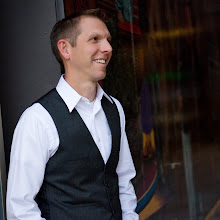Many of us had the same experience this past Christmas, either as a visitor in the home church of a family member or in our own church. Sure, there were varying degrees of excellence but there was something every Christmas program had in common this year. They all took time and resources. The amount of time was, most likely, dependent on the size of the church. As churches grow, so do the expectations for the special performances. I know of churches whose preparation for the Christmas service begins in July.

The problem with my experience this Christmas was that I know a little something about the church. The church held all the right beliefs, but those beliefs were not working into the lives of the members. The Gospel was not finding its way into conversations about relationships, parenting, work and overcoming sin. With this in the background, it was hard to sit in this multi-million dollar facility during an excellent Christmas Eve service and relax. All I could see was the hours of effort to produce temporary excitement while many members were left alone to apply the Cross to their lives. It was like the 40 minutes of Christmas dinner that took 8 hours to prepare.
Excellent programming and big services are not inherently wrong. There are great examples of churches with excellent programming, growing numbers, building projects and changed lives but they are few. The "big" things too often distract from business of the church - at least as Jesus defined it. My Christmas experience is a great example. I only know because recently I have been broken over similar misplaced priorities.
Four weeks ago I wrote of the simple revelation that broke me and my fellow pastors and leaders. Jesus commanded us to make disciples (Matt. 28:19-20) and he takes responsibility for building the church (Matt. 16:18). Three weeks ago I discussed why it is tempting to pursue church-building over disciple-making. Two weeks ago I looked at the detrimental effects of focusing on church-building. The next three posts will examine 11 downstream effects (according to the New Testament) of committing resources to discipleship as a priority.
- Christ is central.
The first one is simple. Real disciples of Christ really put Christ first (Eph 4:15). Jesus freaks will distinctively mark a disciple-making church. - The word of God increases. As Luke recounts the history of the first church, he mentions an interesting indicator of success. He tells us that "the word of God increased" (Acts 6:7 and Acts 12:24).
In the first case, the number of disciples was increasing in response to daily, ceaseless preaching "in the temple and from house to house" that Jesus was the Christ (Acts 5.42). So much was the increase that the shepherds needed to create structure to better minister to the physical and spiritual needs of individuals (Acts 6:2-4).
Think of the situation. The numbers were increasing. Peter spoke and 3000 were "added to their number" in one day (Acts 2:41). It would have been very tempting to start thinking on a large scale, exclusively. My mind would be focused on how to leverage Peter's preaching for greater impact. But, in the explosion, the apostles did not let go of the simple focus on "feeding the sheep" and the word of God increased (Acts 6:7).
In the second case, Luke provides another of his many contrasts. Herod put on his royal robes and gave great oration. His speech led the crowds to proclaim, "this is the voice of a god, not of a man!" (Acts 12:22). Big production. Big response. Big contrast to the increase of the word of God:Immediately an angel of the Lord struck him down, because he did not give God the glory, and he was eaten by worms and breathed his last. But the word of God increased and multiplied. (Acts 12.23–24)
When a church maintains its focus on making disciples the word of God increases. This is counter intuitive to the natural man. In our natural thinking, the word of God increases with the volume and reach of the delivery... not so with kingdom of God. The word increases when we invest in one another, speak to one another, spur one another, pray with one another, weep with one another and love one another.
When disciples of Jesus are made in the church, the word of God increases in the church. This gives the Holy Spirit a vocabulary that builds by pointing to the promises we have in Christ (Hebrews 6:13-20 and John 14:26). - The Gospel is cherished. Disciple making begins with an assumption: disciples must be made. We all need to change and change begins with honesty about our failures. Being transparent about sin destroys any silly notion that we can achieve a righteousness of our own even by our own standards (Romans 3:21-24 and 1 Timothy 2:3-6). The Gospel is every disciple’s only hope and, when disciple making is the focus of the church, the Gospel is cherished.
Additional Resources
Changing Lives - Faithwalkers 2009 - audio from Great Commission's recent Christmas conference.
A message (.mp3) to our leaders regarding the practical effects of this change in paradigm
"The Trellis and The Vine" - by Colin Marshall and Tony Payne









0 comments:
Post a Comment